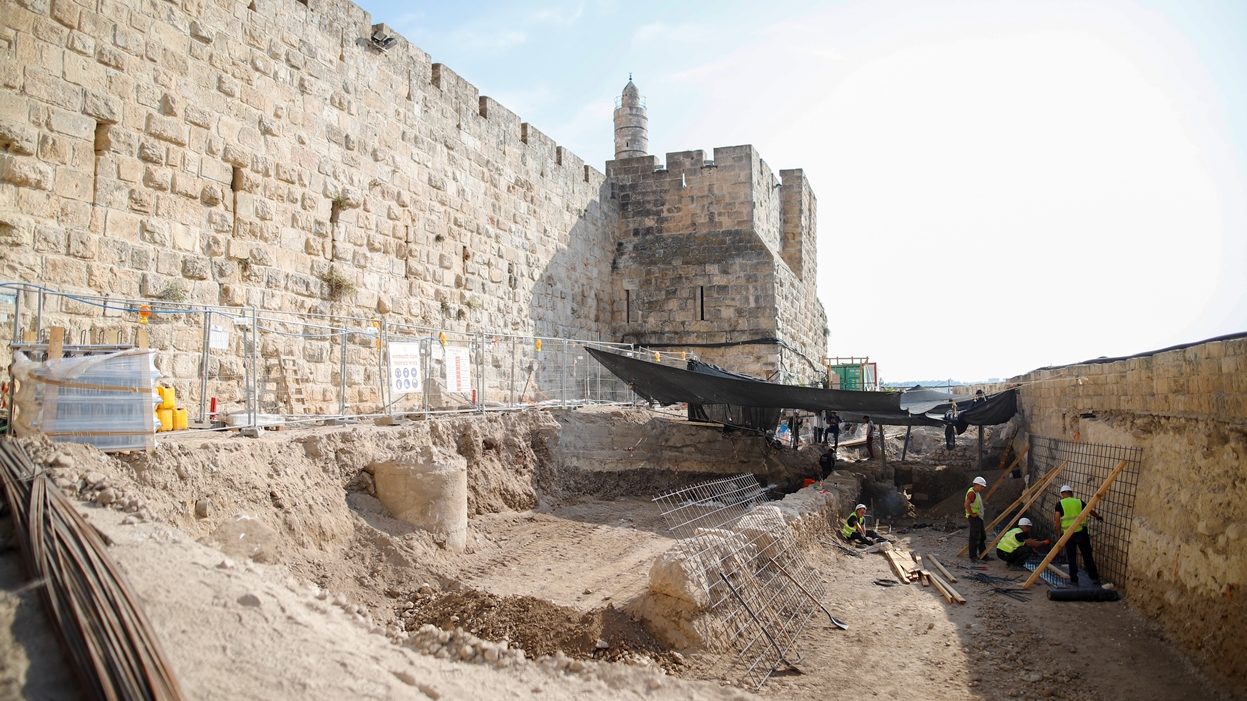Using Downtime, Israel’s Tourism Industry Renovates for the Post-COVID Tourist
While international tourists have been barred from entering Israel, the country’s parks and attractions have renewed and upgraded for returning and first-time foreign visitors.
Israel saw a record number of tourists in 2019, the tourism industry’s last full year of activity, when almost 4.6 million tourists visited the country. However, the past year has been difficult, to say the least.
“We had approximately two months of tourism in 2020,” Noga Sher-Greco, director of religious tourism at Israel’s Ministry of Tourism, told The Media Line. “We are marking a year exactly since the skies were closed.”
But while tourists have been barred from entering the country, Israel’s tourism industry has been taking advantage of the downtime to renovate and upgrade, as business owners and site managers eagerly await the tourists’ return. “The tourism industry in Israel, its sites and attractions, is preparing – renovating, upgrading and developing new content. There are new attractions that we are revealing to create interest,” Sher-Greco said.
Some 18% of 2019’s tourists came to Israel as pilgrims, according to Sher-Greco. Additionally, a quarter of tourists visit the country looking to sightsee, and the Tourism Ministry official points out that this means they are very likely to visit sites of religious significance, considering the centrality of religion to the land and its history. Accordingly, special emphasis has been put on preparing for Christian tourism, developing new attractions and upgrading existing ones.
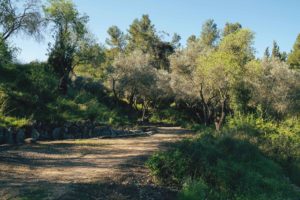
The Emmaus Trail is set against the picturesque background of the Judean Mountains and their foothills. (Daniel Sonnenfeld/The Media Line)
One such attraction is the Emmaus Trail, which begins at the village of Abu Ghosh, about six miles west of Jerusalem, and is set against the picturesque background of the Judean Mountains and their foothills. A draw for Christian pilgrims, the path is believed to be the road on which two of Jesus’ disciples met with him after the Resurrection. Final steps are now being taken to make the path more easily accessible. In addition, tourists will be able to follow new signage and make use of a guidebook especially prepared for walkers of the path.
The hike, though, offers more than religious significance. With two Roman-era tombs, an ancient water system, a Mediterranean setting with olive and fig trees, among other sights, tourists of all inclinations will find the path attractive. The route ends at Emmaus Nicopolis, the site of the ancient Roman city where Jesus is believed to have been recognized by his disciples after the Resurrection. Christian visitors will be able to celebrate Mass within the ruins of the Byzantine church.
The Emmaus Trail is suited for a post-pandemic audience, which is likely to prefer outdoor attractions. “I believe that, after COVID, tourism will change slightly. The groups will be smaller, people will look for open spaces,” Sher-Greco said.
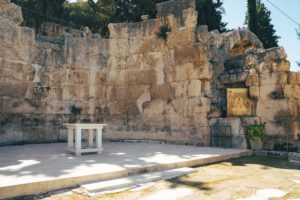
Christian visitors will be able to celebrate Mass within the ruins of the Byzantine church on the Emmaus Trail. (Daniel Sonnenfeld/The Media Line)
This has pushed the development of suitable attractions throughout the country. For example, Israel Nature and Park Authority has collaborated with the Christian Information Center on a pilot program where visitors register for Mass and services. “They’ve created the infrastructure in four national parks in which you can celebrate Mass. This means that when pilgrims come and want to pray in an open space, they can,” she said.
It is not only Christian sites that are renovating. The Tower of David Museum, housed in the iconic Ottoman citadel in the Old City of Jerusalem, and a major city attraction, also is trying to make lemonade from lemons and push forward with renovations during this difficult time for the industry.
The museum already had plans for a major facelift and upgrade, Caroline Shapiro-Weiss, the museum’s spokeswoman, told The Media Line. But once it became clear that the pandemic and its limitations were here to stay, “the decision was made to ramp up all the efforts with regard to the renewal of the Tower of David.” Instead of a three-year process of gradual renovation, the museum has decided to concentrate the work, and the expected time has been halved.
Visitors arriving can expect to experience “a whole different level of engagement and facilities through the Tower of David, as a gateway to the city,” Shapiro-Weiss said. The upgrade includes revamping the permanent exhibition and building a new entrance. An emphasized goal of the renewal is to make the citadel accessible to disabled visitors, a goal shared by many of the sites that are renovating.
On a smaller scale, the museum also is working to accommodate the requirements of visitors facing a global pandemic. The museum has created three self-guided tours, since most people do not want to be thrust into a crowd of strangers. “Now all of our tours are self-guided, two of the self-guided tours are actually outdoors,” Shapiro-Weiss said.
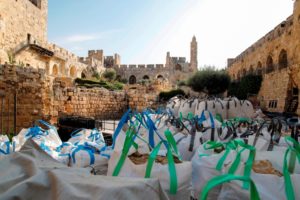
The Tower of David Museum is upgrading its permanent exhibition and building a new entrance. (Ricky Rachman)
Jewish sites also have changed to cope with the current situation. Sher-Greco says that a prominent example is the Western Wall, which has set itself up in a manner suitable to the pandemic, allowing people to pray in “capsules.” An archeological site below the Western Wall’s prayer plaza, which includes a Roman road from the time of the Second Temple, also will open to the public in the future.
Another site of interest for tourists, and especially Christian tourists, is the Terra Sancta Museum in the Old City of Jerusalem, in which two new sections are currently being constructed. The museum intends to show archeological findings discovered by Franciscan friars in the country, which have never been displayed before. Unique treasures donated to the Franciscan Order over the centuries from all over the world, such as centuries-old French vestments, also will go on display. Father Stéphane Milovitch, the director of cultural properties at the Holy Land Custody, told journalists that since Jerusalem is home to three religious communities, it is important to have a museum dedicated to each community. “We would like besides these museums, to have also a Christian museum of the city,” he said, adding that he hopes that this newly renovated museum will serve that purpose.
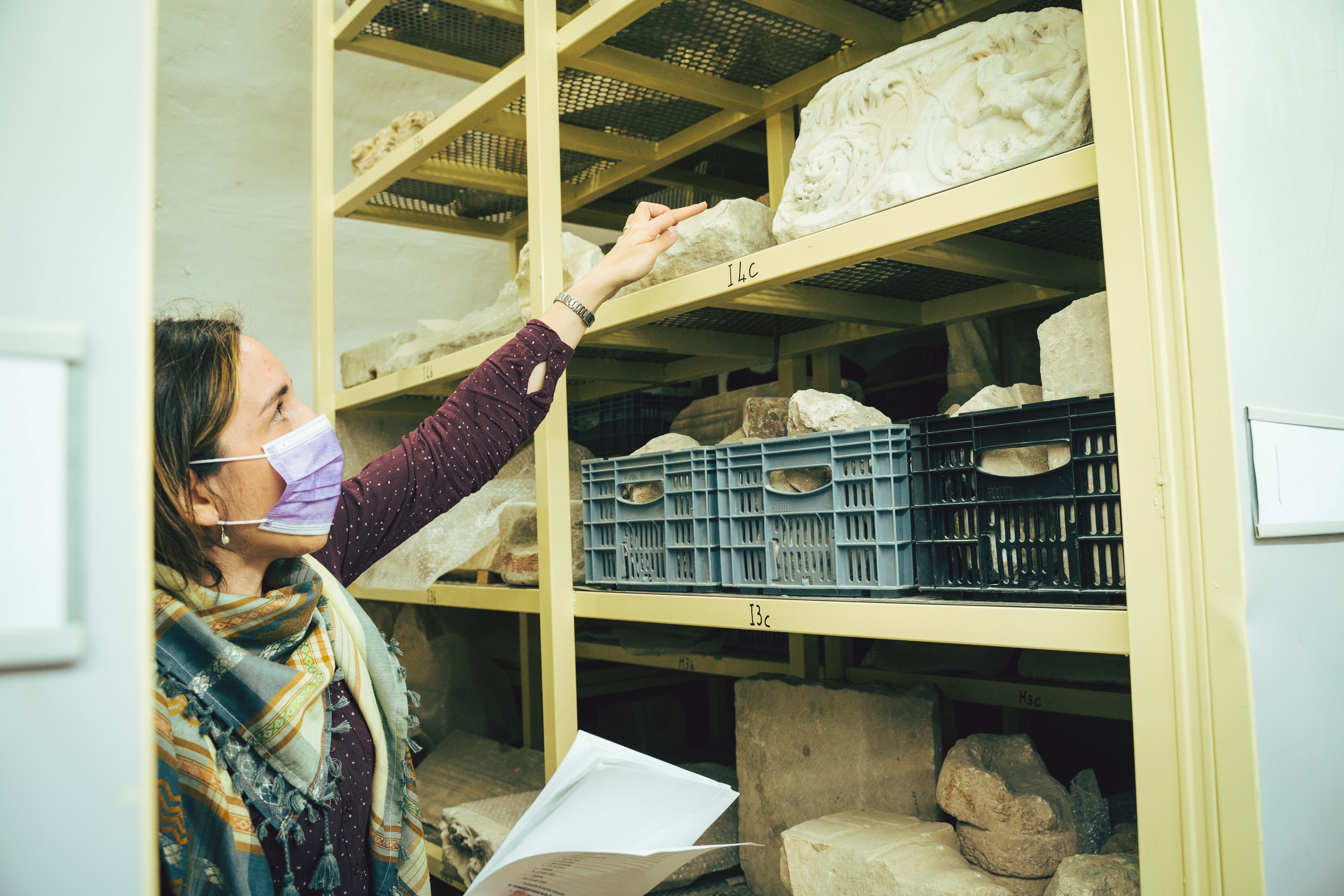
Dr. Daniella Massara catalogs relics from the Crusader era found in the Church of the Holy Sepulchre that will be displayed for the first time. (Daniel Sonnenfeld/The Media Line)
But funding issues, stemming from the difficulties created by the coronavirus pandemic, are delaying the museum’s opening. There currently is no fixed date for the opening of the new wing. Sher-Greco explained that there are other projects that also have suffered due to the situation. “There are other projects under construction that are stuck, whether because their suppliers or designers can’t come here, or materials cannot,” she said.
The prevailing uncertainty regarding the expected return of tourists has cast another shadow on these efforts. No official date has yet been set for the reopening of Israel’s skies.
“The Tourism Ministry has submitted a plan, a suggestion to the Ministry of Health, and it is awaiting approval,” Sher-Greco said. The government and the Health Ministry hold all the cards, she said, but added that reopening will probably happen in the summer.
With a majority of Israel’s citizens vaccinated, Sher-Greco says that “we plan to be the first to reopen safely, in a way that will allow the potential tourist to feel safe with regard to health concerns.”

